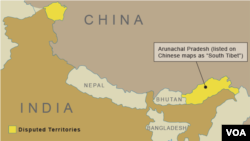BEIJING —
China said on Monday it regretted that two Indian athletes were blocked last week from going to China but defended measures it has put in place in response to a border dispute which led to the ban on the pair traveling.
Relations between the nuclear-armed Asian giants have been warming recently after decades of hostility following a 1962 border war. Indian Prime Minister Manmohan Singh is due to visit China this month.
Nevertheless, the refusal last Thursday by a Chinese airline to let the two teenage female archers board an aircraft bound for China, where they hoped to take part in a competition, underscored the sensitivity of the border dispute.
The pair were from the disputed border state of Arunachal Pradesh, where India and China fought the border war in 1962. China claims the region as South Tibet.
China refuses to stamp visas into the passport of people from disputed territories, but staples them in instead, a practice that infuriates India. At times, even Chinese companies, like China Southern Airlines involved in last Thursday's incident, reject such visas.
We regret that the two young India athletes could not come to participate in the relevant competition,” Chinese Foreign Ministry spokesperson Hua Chunying said at a regular briefing.
Indian politicians were outraged that the athletes could not go to China.
Despite fast-growing economic ties, the neighbors have done little to resolve overlapping claims along their 4,000-kilometer border.
Hua said China's stand on the border was clear and consistent, and the related measures it took were “legal and effective.”
China had been flexible in handling the visa issue, in the absence of a resolution of the border dispute, to facilitate travel by people from both sides, she said.
She said the border problem could not be resolved overnight but leaders from both countries hoped to resolve it. She said she was not able to say if Singh would discuss the border with Chinese leaders on his October 23-24 visit.
Relations between the nuclear-armed Asian giants have been warming recently after decades of hostility following a 1962 border war. Indian Prime Minister Manmohan Singh is due to visit China this month.
Nevertheless, the refusal last Thursday by a Chinese airline to let the two teenage female archers board an aircraft bound for China, where they hoped to take part in a competition, underscored the sensitivity of the border dispute.
The pair were from the disputed border state of Arunachal Pradesh, where India and China fought the border war in 1962. China claims the region as South Tibet.
China refuses to stamp visas into the passport of people from disputed territories, but staples them in instead, a practice that infuriates India. At times, even Chinese companies, like China Southern Airlines involved in last Thursday's incident, reject such visas.
We regret that the two young India athletes could not come to participate in the relevant competition,” Chinese Foreign Ministry spokesperson Hua Chunying said at a regular briefing.
Indian politicians were outraged that the athletes could not go to China.
Despite fast-growing economic ties, the neighbors have done little to resolve overlapping claims along their 4,000-kilometer border.
Hua said China's stand on the border was clear and consistent, and the related measures it took were “legal and effective.”
China had been flexible in handling the visa issue, in the absence of a resolution of the border dispute, to facilitate travel by people from both sides, she said.
She said the border problem could not be resolved overnight but leaders from both countries hoped to resolve it. She said she was not able to say if Singh would discuss the border with Chinese leaders on his October 23-24 visit.






